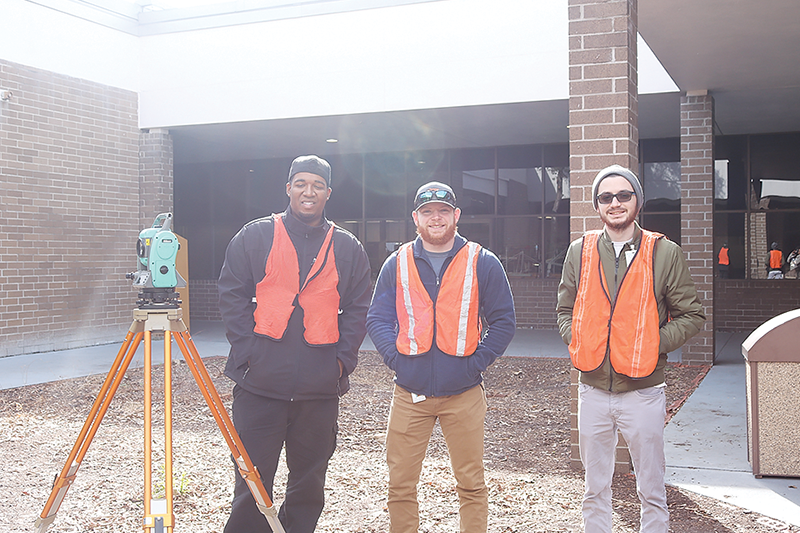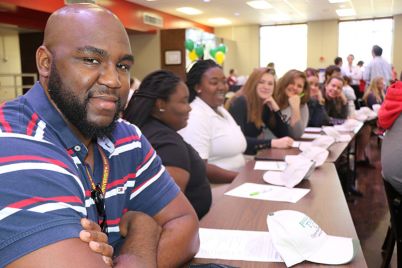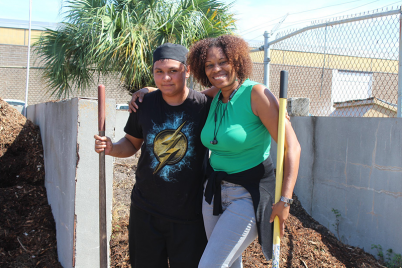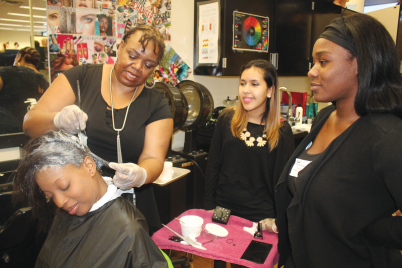Students Tyrone Johnson Jr., Aidan Anderson and Mitchell Schauerman
BY J.A. JONES, Staff Writer
PETERSBURG – On a crisp fall morning, students are learning the applications of drone technology for land surveying from industry professionals at the new Survey Technician Program currently housed at the St. Pete campus of Pinellas Technical College (PTC).
Rohland Bryant, who’s Public Works Academy, Inc. has developed the program along with Faye Watson’s Developing and Building (DAB) Community Services, Inc., seemed pleased about the program.
“So far, the program is going really excellent. We’ve had great subject matter experts who’ve come into the classroom and taught specific topics,” said Bryant. We’ve secured intern positions already, and all are paid internships so they’ll be in school learning and earning.”
Bryant said he feels the students will ultimately be able to enter the job market with skills that will enable them to handle themselves appropriately.
On this day, Wade Hartley of Hartley Aerial Services and Dan Foard of Videophoto Productions are their sharing expertise on drone technology.
“We were showing them how drones can be used for surveying, 3D mapping, topography,” explained Hartley. “You can use drones to model or map a property line from above.”
Foard said the idea is to introduce how the technology can be utilized to its full advantage.
“It’s cost-saving, time-saving and life-saving in lots of instances,” he explained.
Other instructors include experts from survey industry giant George F. Young and the Pinellas County Government.
Currently, Watson is seeking greater support and resources from the industry professionals who encouraged her to begin the journey of developing the course, which is built on an industry-driven approach to workforce development training.
Watson approached PTC about developing and implementing the survey technician program and was directed to Bryant’s Public Works Academy, which offers community training programs at the college.
After presenting Bryant with statistical data on the industry, he agreed that it was a viable training area, and the two moved forward on developing the program together. The curriculum was developed along with industry professionals.
Watson acknowledged the support of equipment manufacturer GPServe, who donated the first set of instruments, and Superior Surveying Services out of Tampa who gave another set of equipment for the classes.
For the pilot program, they selected five individuals with instruction provided by subject matter experts from the industry.
Aidan Anderson was happy with the program so far.
“I actually really enjoy it; I love being hands-on, and I know it’s a great industry. Before I was in welding so I’m already familiar with measurements, but it’s my first time doing anything with measuring properties.”
Tyrone Johnson, Jr. said he was searching online when he saw an article featuring Bryant and the program in the news.
“I wanted to give it a try because I used to do audits on the computer, but I got tired of sitting in an office. I really like being outdoors. I’m liking it; it’s keeping me focused because I’m interested in it.”
Mitchell Schauerman was also intrigued while reading about it in the paper and says he loves the program so far.
“I was in insurance since high school, so I was on the computer for about four or five years. I’m still working in that job, but the change in environment, being outdoors, really interested me, so that’s what drew me in.”
The Bureau of Labor Statics reported in 2016 that the median pay for survey technicians was $42, 450, $20.40 an hour. That type of salary can lift someone out of poverty.
For more information on the Survey Technician Program, contact Rohland Bryant at (727) 893-2500 ext. 2589, (727) 580.2248 or bryantro@pcsb.org.
To reach J.A. Jones, email jjones@theweeklychallenger.com








